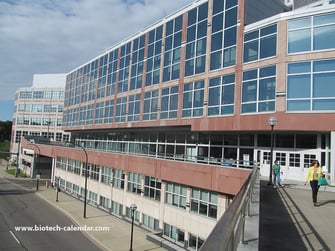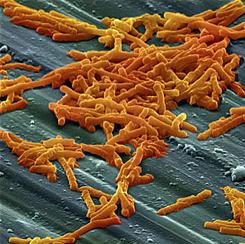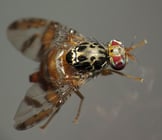
The Comprehensive Cancer Center at the University of Michigan, Ann Arbor is one of only 45 comprehensive cancer centers in the United States, and provides cutting-edge cancer research. Researchers from 48 different university departments and 9 schools work together in the cancer center to find answers to some of the toughest questions that scientists face when learning about cancer. The university and Cancer Center will soon be expanding their research capabilities thanks to a generous $17.5 million donation from philanthropists Madeline and Sydney Forbes.
Read More
Tags:
University of Michigan,
Midwest,
cancer research,
Ann Arbor,
MI,
UMich,
new funding,
2016,
BioResearch Product Faire,
Comprehensive Cancer Center,
Forbes Institute for Cancer Discovery,
Madeline and Sidney Forbes

Clostridium difficile, more commonly referred to as C. diff, is a bacteria that makes half a million American's sick each year, and is responsible for over 25,000 deaths annually, both directly and indirectly. The bacteria can lead to serious illnesses in the gut, that can cause diarrhea and colon inflammation. Often times, C. diff infections can be caused by the over use of antibiotics, which affect the healthy bacteria in the gut and provide opportunity for C. diff bacteria to grow in that area.
Researchers from the University of Michigan, Ann Arbor have received a five-year, $9.2 million grant from the National Institute of Allergy and Infectious Diseases to further study C. diff, to learn more about it with the aim of developing new treatment methods. (Image of C. diff bacteria courtesy of Cjc2nd via Wikimedia Commons)
Read More
Tags:
University of Michigan,
Midwest,
Ann Arbor,
BioResearch Product Faire Event,
MI,
UMich,
2016,
Clostridium difficile,
C. diff,
C. difficile,
Bacteria,
gut bacteria
Bioscientists are constantly discovering new methods to accelerate bone healing. First, we saw them use stem cells to regenerate ribs, and then we saw them add a protein that boosts bone regeneration. Both of these techniques involve introducing new and foreign substances into the body, which run the risk of rejection. A new study from the University of Michigan, Ann Arbor shows that, in fact, cells already at the injury site know how to repair bone if you know how to remind them.
Read More
Tags:
University of Michigan Ann Arbor,
Ann Arbor,
BioResearch Product Faire Event,
MI,
UMich,
2016
Two years ago, we saw a remarkable advance in 3D printing technology: a professor and a doctor at the University of Michigan, Ann Arbor designed a splint to open the collapsing windpipe of a baby. A licensing agreement signed this month between these specialists and the 3D printing company Materialise will help such splints become a medical norm.
Read More
Tags:
University of Michigan Ann Arbor,
2015,
Ann Arbor,
BioResearch Product Faire Event,
MI,
UMich
Though it’s common knowledge that fruits and vegetables are part of a balanced diet, life science researchers continue to find health benefits in these foods beyond what anyone expected. Take the case of Ohio State University, for example, who three years ago found out that apples can lower levels of bad cholesterol. A new study from the University of Michigan, Ann Arbor suggests that bananas can fight off viruses we’d otherwise be susceptible to.
Read More
Tags:
University of Michigan Ann Arbor,
2015,
Ann Arbor,
BioResearch Product Faire Event,
MI,
UMich
Yeasts are valuable as both tools and allies in the life sciences. We saw how yeast taught Ann Arbor researchers about DNA and showed Urbana-Champaign researchers how to save bats from a deadly disease. Now a team at the University of Michigan at Ann Arbor is learning from yeasts how to slow the onset of another deadly disease, namely cancer.
Read More
Tags:
University of Michigan Ann Arbor,
2015,
Ann Arbor,
BioResearch Product Faire Event,
MI,
UMich
 When dieting or eating foods with artificial sweeteners, many people do not get the feeling of being full that they get when eating foods with real sugars. But how can we distinguish between between these two sweeteners, to feel full or not?
When dieting or eating foods with artificial sweeteners, many people do not get the feeling of being full that they get when eating foods with real sugars. But how can we distinguish between between these two sweeteners, to feel full or not?
Read More
Tags:
University of Michigan,
Midwest,
2015,
Ann Arbor,
BioResearch Product Faire Event,
MI,
UMich,
Neurons,
Artificial Sweetener,
Fruit Fly,
Sugar
Though it is not studied very heavily, microRNA plays a crucial role in several of life’s functions. We saw in a previous Science Market Update post how a strand of microRNA can decide whether or not embryonic tissue develops with defects, and how an Ohio State University research team used this information to develop methods of preventing such defects. Now a group of researchers at the University of Michigan, Ann Arbor has developed a novel way to pinpoint the previously elusive particles of microRNA.
Read More
Tags:
University of Michigan Ann Arbor,
2015,
Ann Arbor,
BioResearch Product Faire Event,
MI,
UMich
Despite our advances in dental hygiene technology and promotion of healthy habits, plaque continues to plague our nation. Surveys indicate that nearly 39 percent of adults in the United States have periodontitis, also known as gum disease. At the University of Michigan, Ann Arbor, a team of bioscientists is working to find more effective ways to destroy plaque.
Read More
Tags:
University of Michigan Ann Arbor,
2015,
Ann Arbor,
BioResearch Product Faire Event,
MI,
UMich
DNA is a lot like a genetic recipe: change up the order of the ingredients, and you might get an entirely different dish. At the University of Michigan, Ann Arbor, bioresearchers are cooking up some new results that better explain the effects of modifying DNA and what that means for evolution as a whole.
Read More
Tags:
University of Michigan Ann Arbor,
2015,
Ann Arbor,
BioResearch Product Faire Event,
MI,
UMich




